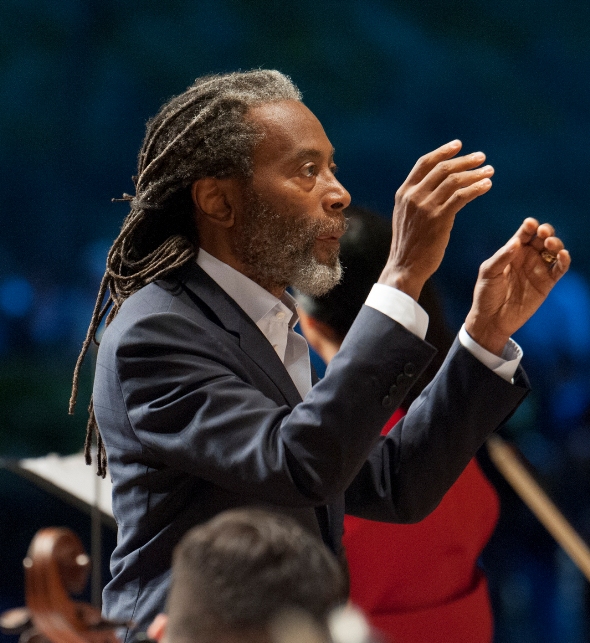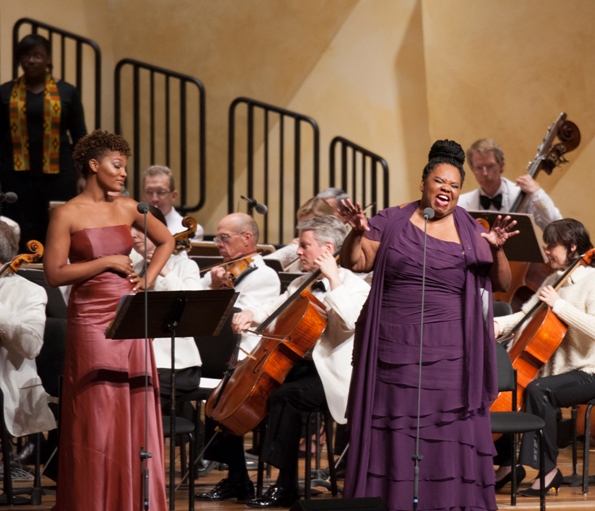From father to son, the sorrows of Catfish Row become cherished pleasure for Bobby McFerrin
Review: “Porgy and Bess” highlights performed by the Chicago Symphony Orchestra and vocalists conducted by Bobby McFerrin at the Ravinia Festival.
By Daniel Hautzinger
Bobby McFerrin grew up listening to George Gershwin’s adored Great American Opera, “Porgy and Bess.” His father Robert McFerrin, a prominent baritone who was the first African American man to sing at the Metropolitan Opera, contributed the singing voice of Porgy for Otto Preminger’s 1958 film version of the opera, starring Sidney Poitier and Dorothy Dandridge.
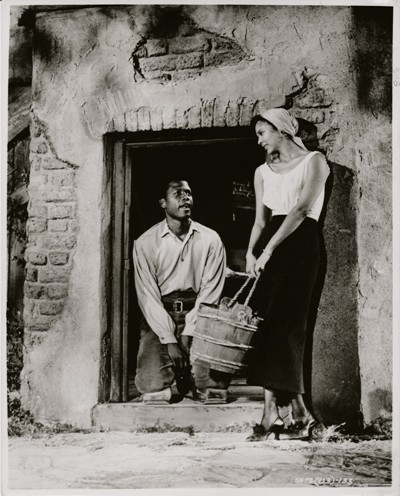 When the soundtrack to the film came out, the McFerrin family “played it over and over again,” the younger McFerrin told Mark Thomas Ketterson for an article in this year’s Ravinia program book. “The music became the background music for our lives for a good long while.”
When the soundtrack to the film came out, the McFerrin family “played it over and over again,” the younger McFerrin told Mark Thomas Ketterson for an article in this year’s Ravinia program book. “The music became the background music for our lives for a good long while.”
So it makes sense that McFerrin would return to the opera as an adult. On July 8 in Ravinia’s Pavilion, he conducted a concert version of Porgy and Bess with five soloists, a chorus, and the Chicago Symphony Orchestra in their first concert of their annual Ravinia residency.
Despite an unseasonable chill and a threat of rain that eventually became a reality, a cheerful audience packed the pavilion and scattered through the lawn. The drear weather fit the mood of the music, however: downcast, ominous, mournful, pathetic.
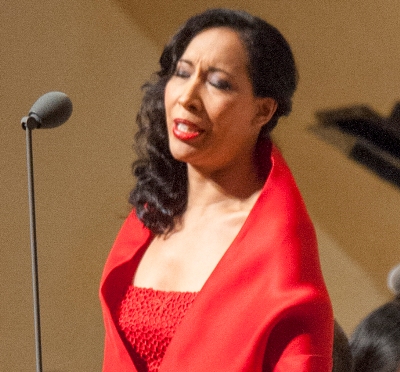 One would think McFerrin would clear some of those dark clouds with the joyful energy he often displays while singing. Instead, he evinced only seriousness, his stern, intense gaze holding the orchestra and chorus as he confidently led them through the opera’s greatest hits.
One would think McFerrin would clear some of those dark clouds with the joyful energy he often displays while singing. Instead, he evinced only seriousness, his stern, intense gaze holding the orchestra and chorus as he confidently led them through the opera’s greatest hits.
There are quite a few of those, perhaps the most famous being “Summertime,” which soprano Nicole Cabell crooned lovingly, ending it with a poignant wail. But many other songs have found a life outside the opera: “My Man’s Gone Now,” sung with powerful anguish by soprano Lauren Michelle, whose glowing voice was a light amidst the dark hues of the orchestration; “It Ain’t Necessarily So,” in which Brian Stokes Mitchell was entirely convincing and compelling as a histrionic huckster; and “I Loves You, Porgy,” given grand operatic treatment by Cabell.
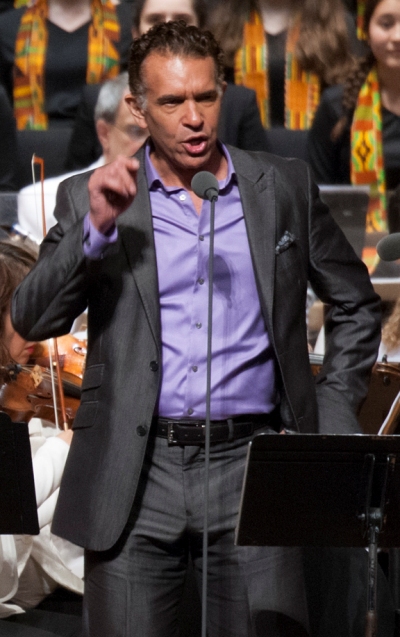 The Broadway vocalist Stokes Mitchell was the star of the night, taking the songs of Porgy, Jake, and Sportin’ Life. He displayed a vast range, from the nasal, slimy wheeling and dealing of Sportin’ Life to the deep, passionate outpourings of Porgy in his striking duet with Cabell, “Bess, You Is My Woman Now.”
The Broadway vocalist Stokes Mitchell was the star of the night, taking the songs of Porgy, Jake, and Sportin’ Life. He displayed a vast range, from the nasal, slimy wheeling and dealing of Sportin’ Life to the deep, passionate outpourings of Porgy in his striking duet with Cabell, “Bess, You Is My Woman Now.”
The energetic baritone Stephen Salters and the lush-voiced contralto Gwendolyn Brown received less of the spotlight, but reveled in the broad melismas of “Strawberry Man/Crab Man.”
Much of the excitement came from Vocality, the large chorus in the back of stage. Directed by Josephine Lee and composed of former and current members of the Chicago Children’s Chorus and singers from Elmhurst College and Constellation, the chorus made a vehement crowd, by turns aggressive, soulful, and ecstatic, but always blended and in tune.
An unexpected but welcome burst of enthusiasm flooded the stage immediately after the intermission, with an African drum ensemble courtesy of members of the Ko-Thi Dance Company adding verve to “I Ain’t Got No Shame.” Then, and when the drums returned during bows, McFerrin finally displayed his customary brio, dancing and leading a call and response with the chorus.
Related Link:
- The Ravinia Festival continues through Sept. 13: Click here for a detailed calendar.

